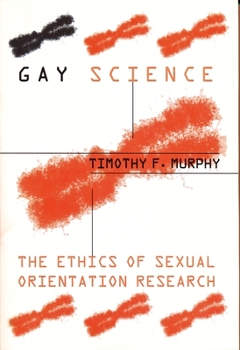Gay Science: The Ethics of Sexual Orientation Research
(Part of the Between Men-Between Women: Lesbian and Gay Studies Series)
Select Format
Select Condition 
Book Overview
Gay Science is the first comprehensive examination of the ethical questions surrounding sexual orientation research. Bioethicist Timothy Murphy presents the views of many gay men and women who detect ominous motives behind this research. If a genetic marker were discovered for homosexual tendencies would genetic screening be used to further discriminate against gay people? If a method for changing sexual orientation were developed would it would be forced upon gay adults, or children whose parents suspected they might grow up to be gay? Given the potential for its misuse, is sexual orientation research fundamentally unethical?
Murphy acknowledges that much of sexual orientation research to date has been bad science, questionable in its motives and methodologically unsound. He examines the social and historical conditions, from the 1880s to the present, that spawned this research and reviews the findings that have often perpetuated confusion about homosexuality. He assesses five major studies on sexual orientation undertaken in the 1990s, from neuroanatomist Simon leVay's study of certain brain structures in gay men to the work of psychologist Joseph Nicolosi. He questions the flawed and simplistic assumptions about sexuality made by much of this research, Murphy argues that a true science of sexual orientation would not be focused exclusively upon homosexuality nor presuppose its pathology. Throughout the book Murphy argues that concerns about the potential misuses of this research do not justify its prohibition. Tackling gay science's most troubling aspects, he contends that if this research leads to the development of effective sexual orientation therapies, informed adults should have the choice to undergo them; he also examines the factors that weigh in favor of a parental right to choose or attempt to influence the sexual orientation of a child, and the ethical limits to such a right. Pointing to the potential benefits of sexual orientation research as well as acknowledging its potential for harm, Murphy ultimately defends gay science in the name of free scientific inquiry. Gay Science argues that the way to ensure the future of gay people is not through censoring sexual orientation research but through working toward a society which uses reseach as a way of dinstinguishing myth from fact and not as an instrument of discrimination.Format:Paperback
Language:English
ISBN:0231108494
ISBN13:9780231108492
Release Date:April 1999
Publisher:Columbia University Press
Length:320 Pages
Weight:0.81 lbs.
Dimensions:0.7" x 5.8" x 8.7"
Grade Range:Postsecondary and higher
Related Subjects
Criticism & Theory Gay & Lesbian Health, Fitness & Dieting Health, Fitness & Dieting History & Criticism Literary Criticism Literature & Fiction Nonfiction Politics & Government Psychology Psychology & Counseling Research Science Science & Math Science & Scientists Science & Technology Social Science Social Sciences Specific DemographicsCustomer Reviews
0 rating





